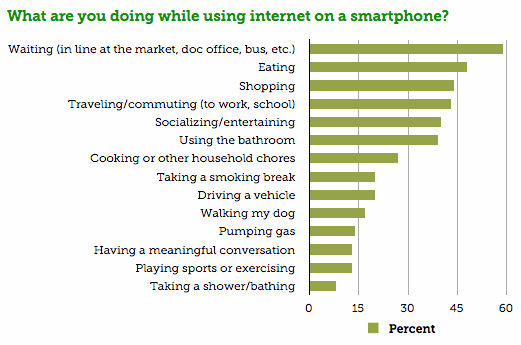Psychologists Find Smarthpone Users Increasingly More Attached to Devices
It appears that there are more problems to worry about with smartphones than just data protection or simple thievery. Nowadays, even attachment to a gadget is cause for worry.
"Watching people who get their first smartphone, there's a very quick progression from having a basic phone you don't talk about to people who love their iPhone, name their phone and buy their phones outfits," said Lisa Merlo, director of psychotherapy training at the University of Florida.
As more Americans are turning to smartphones as their all-in-one solutions, the implications of the growing attachments to these devices are getting worse, according to Merlo.
Merlo said that she has observed a number of behaviors among smartphone users that can be considered "problematic," including patients pretending to use their devices to avoid social contact and patients being so engrossed with the gadgets that they ignore people outright.
"The more bells and whistles the phone has," she says, "the more likely they are to get too attached."
"My phone is in my hand all the time," says Kristyn Wilson, a marketing professional in Columbus, Ohio, who claims that she does everything short of sleeping with it.
Wilson says that she uses her phone to locate stores and compare prices, and to buy entertainment vouchers through Groupon. She even uses it to pay for her coffee at Starbucks with a membership card app. All of this, on top of the normal emailing and texting, means she rarely separates from the device.

Not all smartphone users have Wilson's restraint, however. Users are becoming so attached now that many of them sleep with their smartphones next to them at night.
Michael Breus, a psychologist and sleep specialist, said that his patients often describe how they answer emails, text and surf the Web as they're trying to wind down at night. He says this is a bad idea, because it can lead to trouble sleeping.
"This behavior can increase cognitive arousal," he says, "leading to the No. 1 complaint I hear: `I can't turn off my mind and fall asleep'."
It's no wonder that he hears it so much: more than a third of U.S. adults now own a smartphone, according to the Pew Research Center. Two-thirds of those owners sleep with their phones right next to their bed. What are the chances that smartphone addiction will soon become a recognized disease, like gambling and video game addiction?
"Watching people who get their first smartphone, there's a very quick progression from having a basic phone you don't talk about to people who love their iPhone, name their phone and buy their phones outfits," said Lisa Merlo, director of psychotherapy training at the University of Florida.
As more Americans are turning to smartphones as their all-in-one solutions, the implications of the growing attachments to these devices are getting worse, according to Merlo.
Merlo said that she has observed a number of behaviors among smartphone users that can be considered "problematic," including patients pretending to use their devices to avoid social contact and patients being so engrossed with the gadgets that they ignore people outright.
"The more bells and whistles the phone has," she says, "the more likely they are to get too attached."
"My phone is in my hand all the time," says Kristyn Wilson, a marketing professional in Columbus, Ohio, who claims that she does everything short of sleeping with it.
Wilson says that she uses her phone to locate stores and compare prices, and to buy entertainment vouchers through Groupon. She even uses it to pay for her coffee at Starbucks with a membership card app. All of this, on top of the normal emailing and texting, means she rarely separates from the device.

Data Credit: Idea.org
Not all smartphone users have Wilson's restraint, however. Users are becoming so attached now that many of them sleep with their smartphones next to them at night.
Michael Breus, a psychologist and sleep specialist, said that his patients often describe how they answer emails, text and surf the Web as they're trying to wind down at night. He says this is a bad idea, because it can lead to trouble sleeping.
"This behavior can increase cognitive arousal," he says, "leading to the No. 1 complaint I hear: `I can't turn off my mind and fall asleep'."
It's no wonder that he hears it so much: more than a third of U.S. adults now own a smartphone, according to the Pew Research Center. Two-thirds of those owners sleep with their phones right next to their bed. What are the chances that smartphone addiction will soon become a recognized disease, like gambling and video game addiction?

